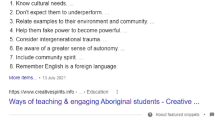Abstract
The author asserts that a liberal arts approach to teaching International Relations (IR) is a unique way to teach undergraduates and to conduct research that is reflective of and relevant to real-world situations. A liberal arts approach includes interdisciplinarity, a bottom-up method to balance the top-down elite orientation of conventional IR, and data collection that focuses on human beings in real-life, concrete conditions. The article offers specific examples of interdisciplinarity in the classroom, including the use of literature, visual arts, and music, to enrich students' understanding of international relations.
Similar content being viewed by others
Notes
Robert Jervis, Perception and Misperception in International Politics (Princeton, NJ: Princeton University Press, 1976).
Shiping Tang, “Outline of a New Theory of Attribution in IR: Dimensions of Uncertainty and Their Cognitive Challenges,” The Chinese Journal of International Politics 5 (2012): 303.
Terry Moran, “Is Bush's Iraq Stance Rooted in Revenge?” ABC News, March 18, 2013, http://abcnews.go.com/US/story?id=90764&page=1, (accessed June 15, 2013).
Ernesto Londoño, “Iraq, Afghan wars will cost to $4 trillion to $6 trillion, Harvard study says,” Washington Post, March 28, 2013, http://articles.washingtonpost.com/2013-03-28/world/38097452_1_iraq-price-tag-first-gulf-war-veterans, (accessed August 25, 2013).
David Kilcullen and Andrew McDonald Exum, “Death From Above, Outrage Down Below,” New York Times, May 16, 2009, http://www.nytimes.com/2009/05/17/opinion/17exum.html?pagewanted=all&_r=1&, (accessed August 25, 2013).
http://www.youtube.com/watch?v=SGptO6j3G-U; http://www.youtube.com/watch?v=YDFqoReof6A, (accessed September 3, 2013).
Katharine H.S. Moon, Sex Among Allies: Military Prostitution in U.S.-Korea Relations (New York: Columbia University, 1997).
Andrew Yeo, Activists, Alliances, and Anti-U.S. Base Protests (New York: Cambridge University Press, 2011), 9.
Katharine H.S. Moon, Protesting America: Democracy and the U.S.-Korea Alliance (Berkeley: University of California Press, 2012).
The New York Times reports that in 2010, as many as 180,000 demonstrations of what sociologists in China describe as “mass incidents” occurred (December, 14, 2011), http://www.nytimes.com/2011/12/15/world/asia/chinese-village-locked-in-rebellion-against-authorities.html?pagewanted=all, (accessed August 28, 2012).
Nicholas D. Kristof, “Getting Smart on Aid,” New York Times, May 18, 2011, http://www.nytimes.com/2011/05/19/opinion/19kristof.html, (accessed August 16, 2012); Ian Parker, “The Poverty Lab: Transforming Development Economics, One Experiment at a Time,” The New Yorker 86 (May 17, 2010), 9.
Edward Miguel and Michael Kremer, “Worms: Education and Health Externalities in Kenya,” Working Paper 8481, National Bureau of Economic Research (Cambridge, MA), 2001, http://www.nber.org/papers/w8481.pdf?new_window=1, (accessed August 12, 2012).
Robert L. Gallucci, “How Scholars Can Improve International Relations,” The Chronicle of Higher Education, November 26, 2012, http://chronicle.com/article/How-Scholars-Can-Improve/135898/, (accessed June 19, 2013).
Ibid.
Author information
Authors and Affiliations
Additional information
The author thanks Stacie Goddard, Paul K. MacDonald, and Jeffrey Frankel for their helpful suggestions and comments.
Rights and permissions
About this article
Cite this article
Moon, K. Homer’s Iliad and Modern IR. Polity 46, 143–149 (2014). https://doi.org/10.1057/pol.2013.35
Published:
Issue Date:
DOI: https://doi.org/10.1057/pol.2013.35




